Charles E W Bean, Diaries, AWM38 3DRL 606/116/1 - June - September 1918 - Part 9
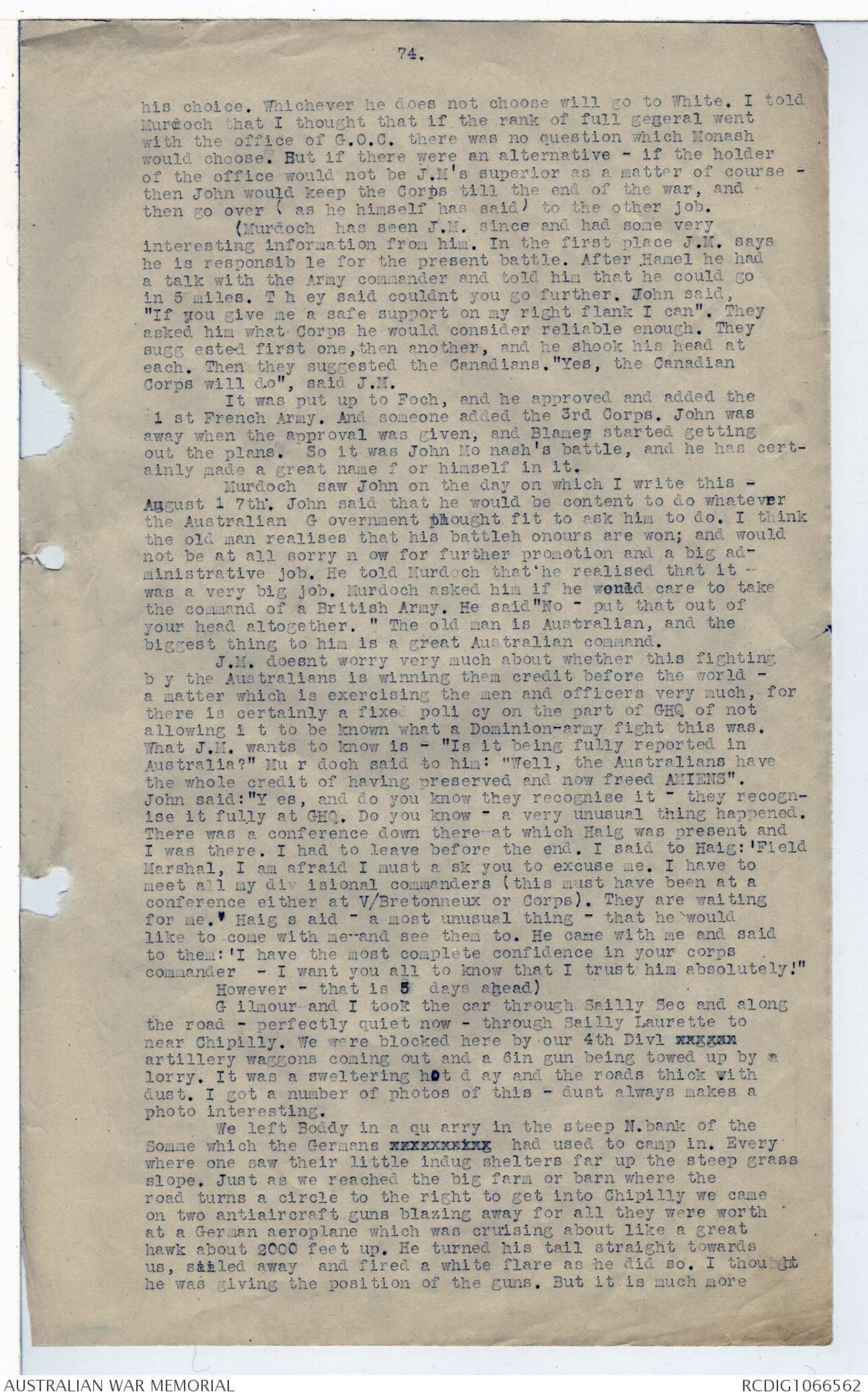
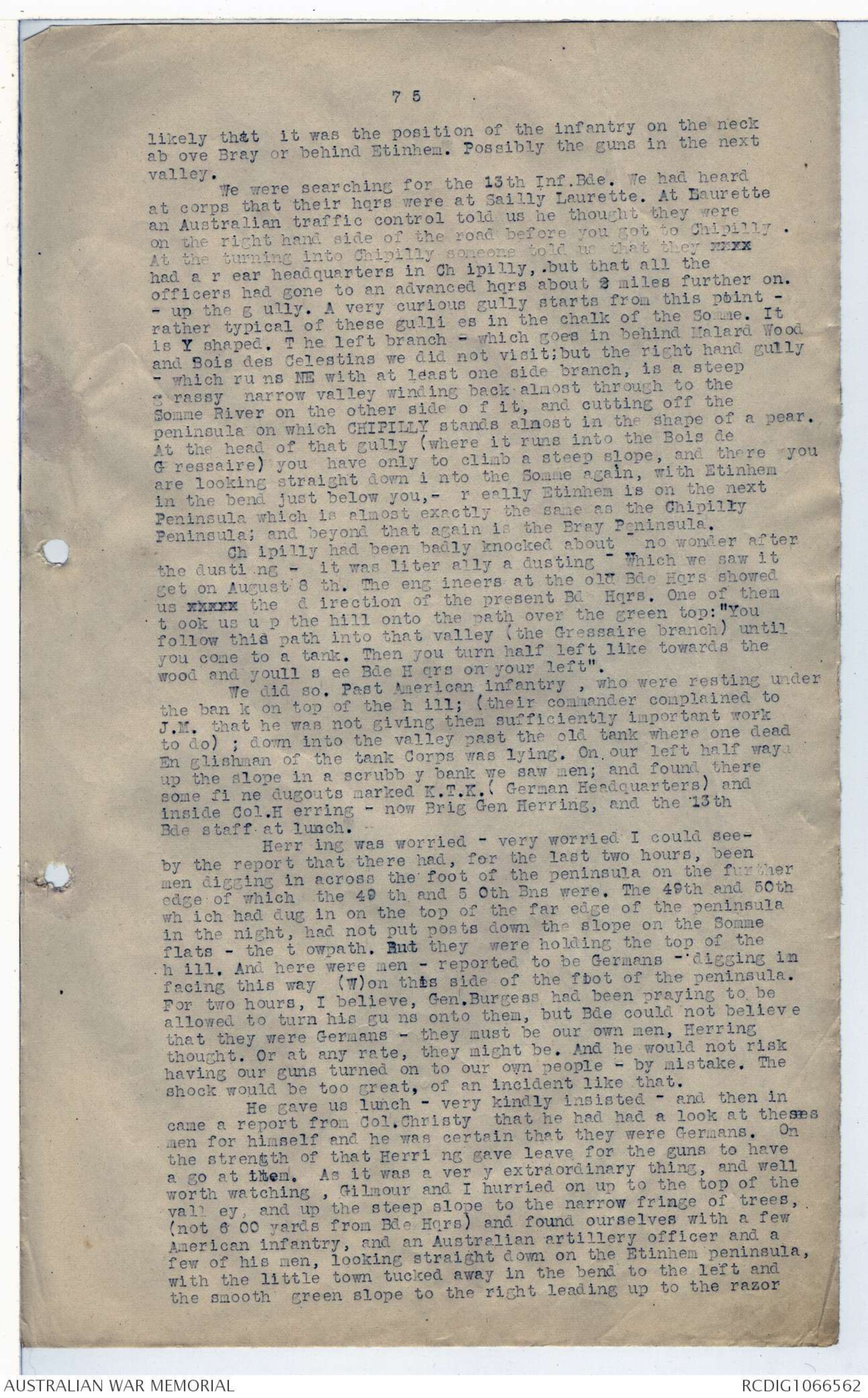
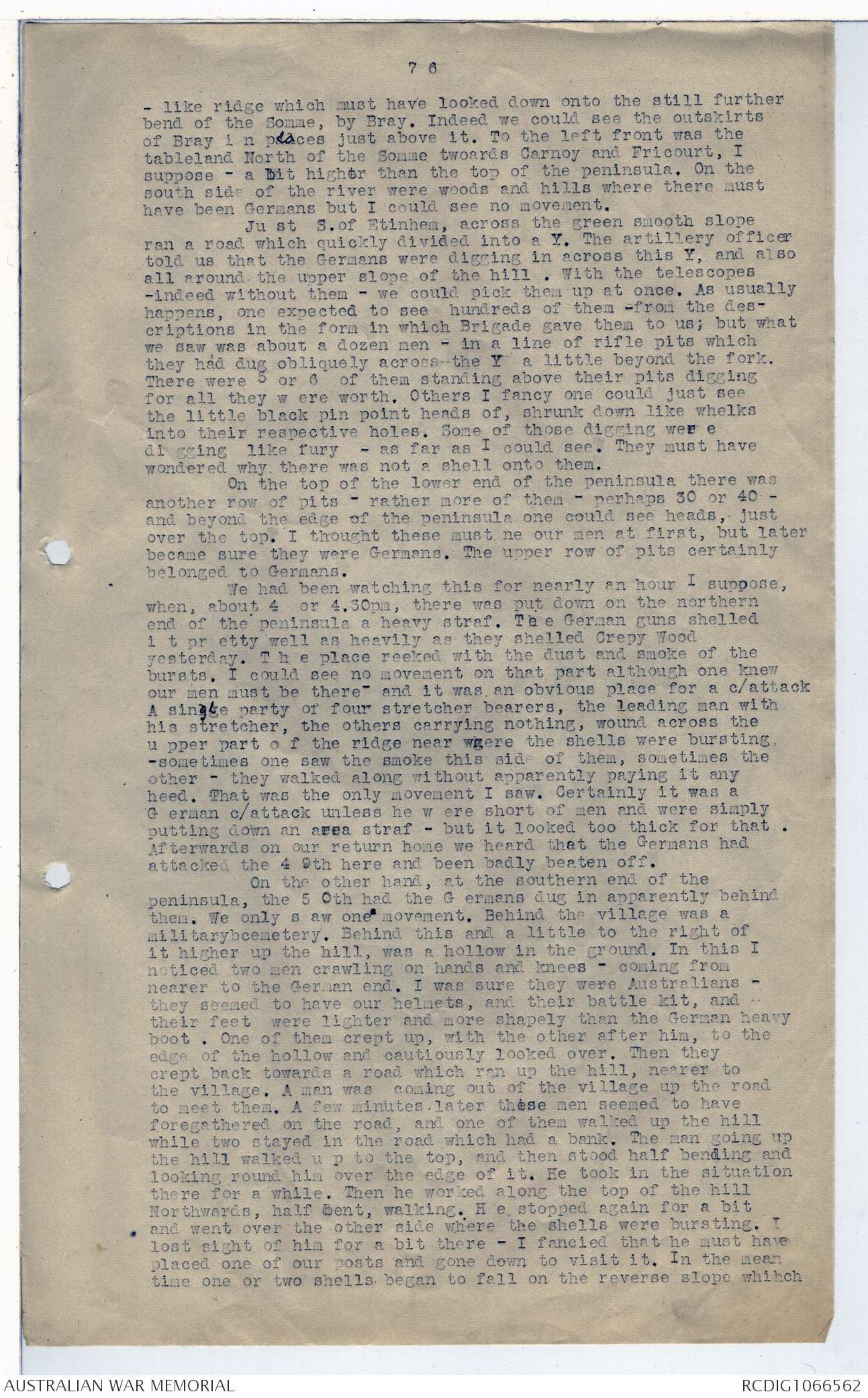
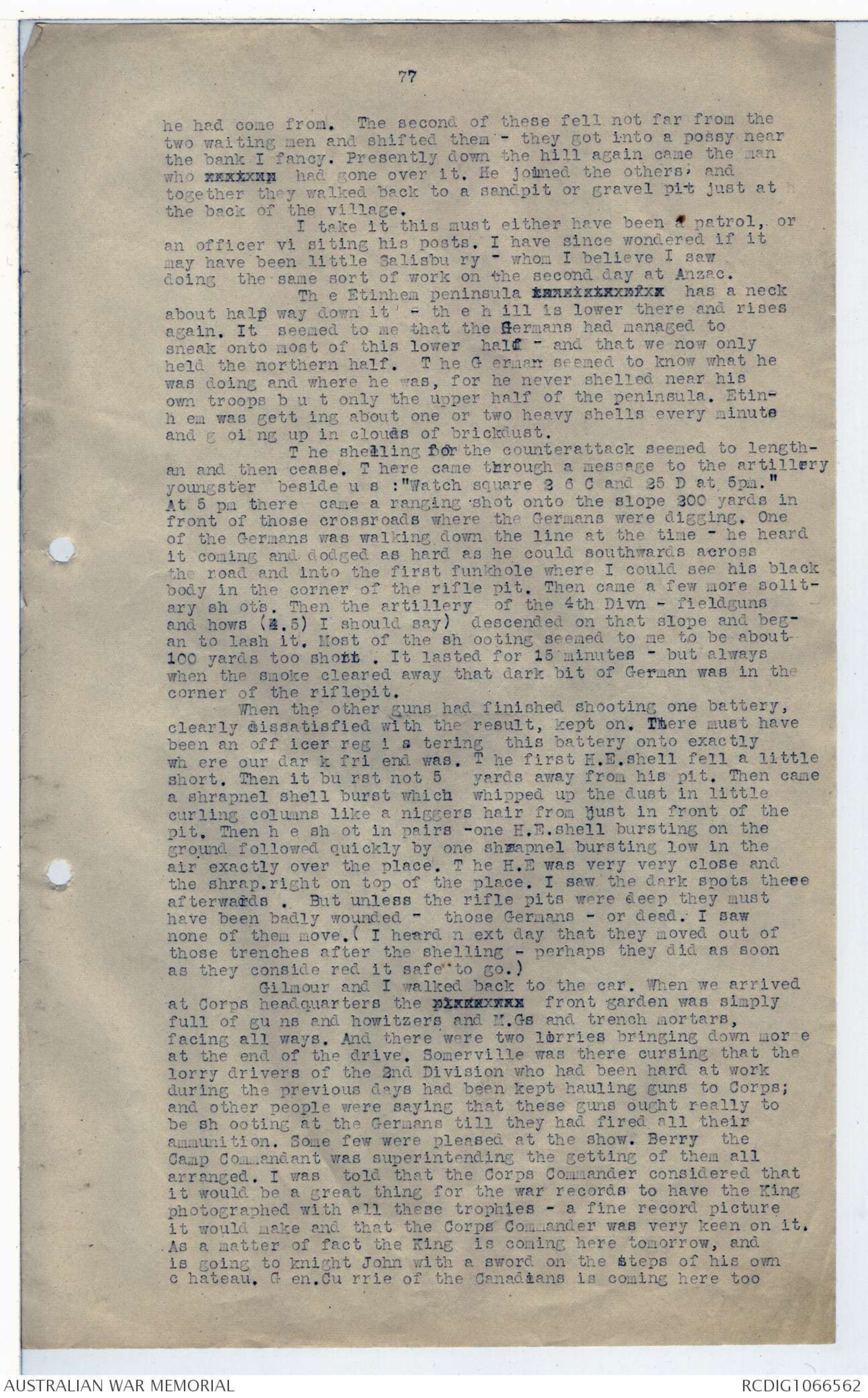
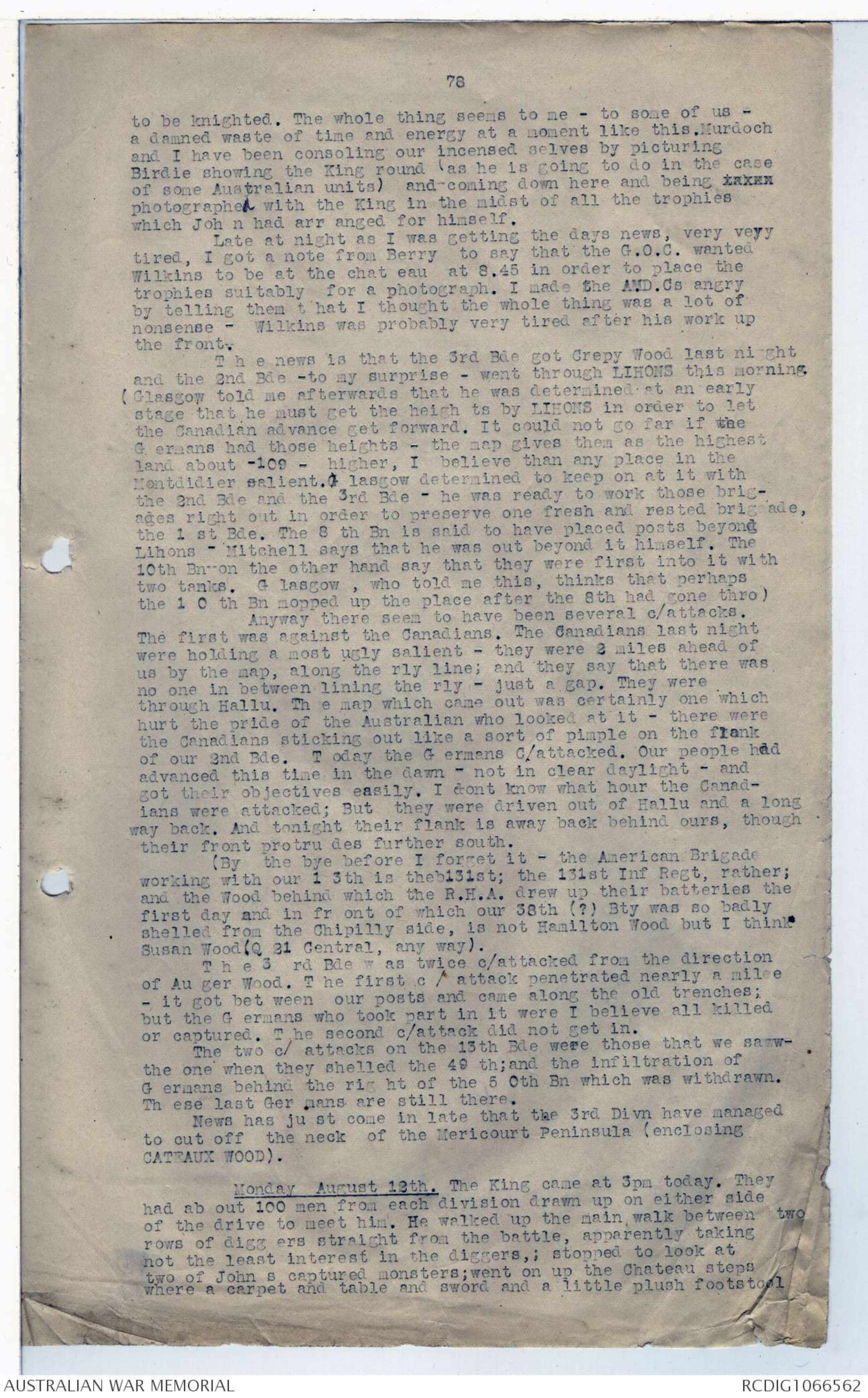
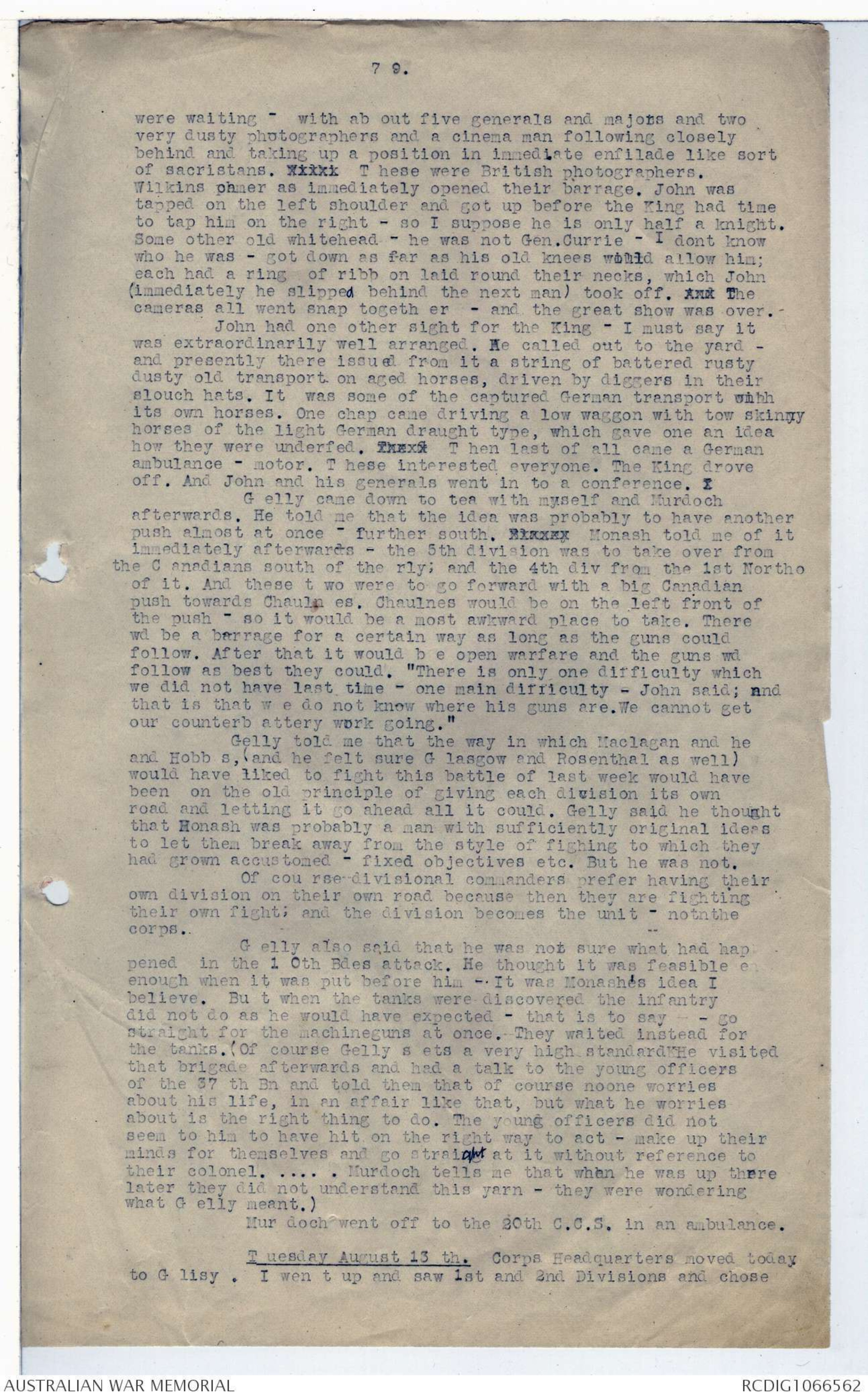
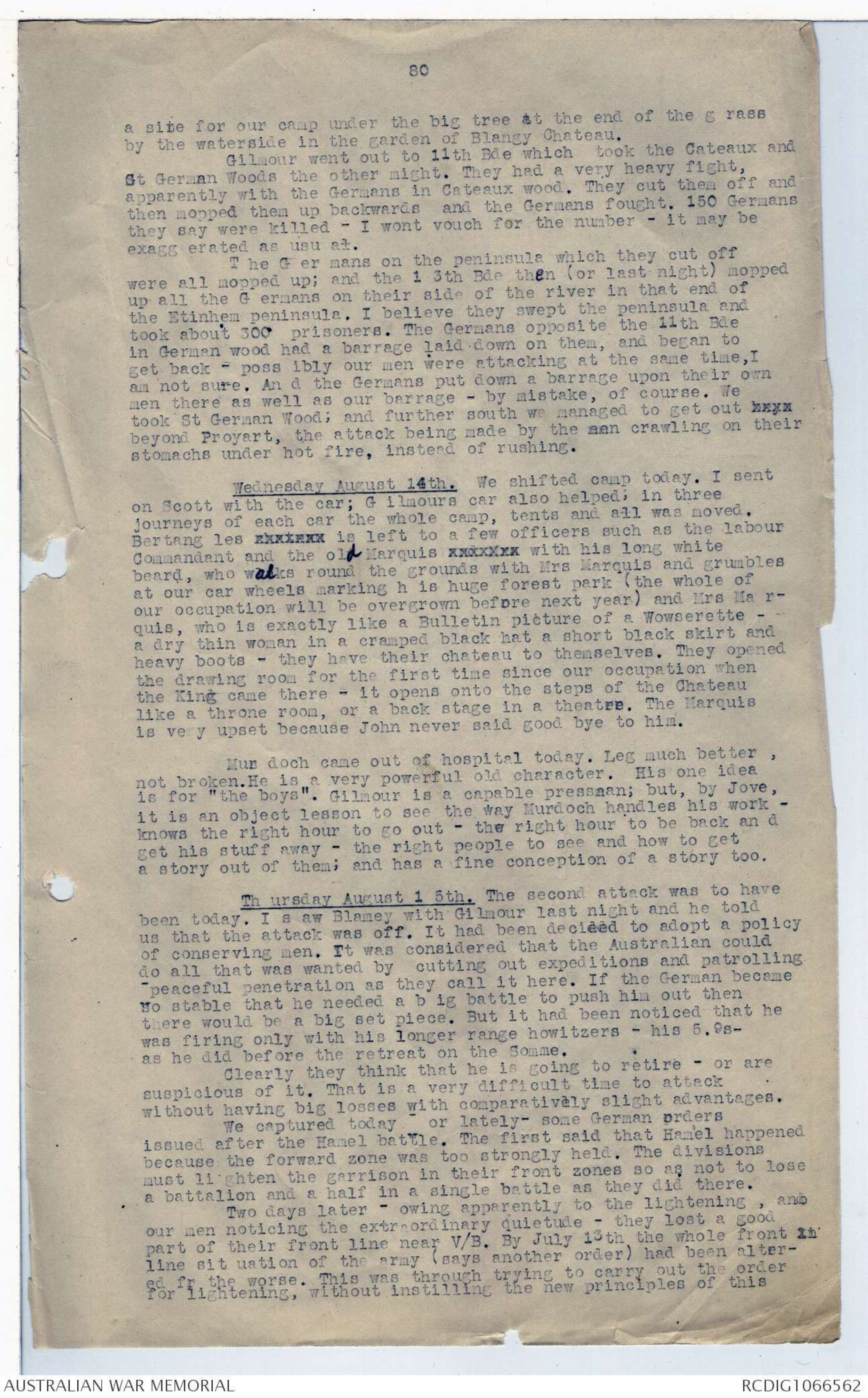
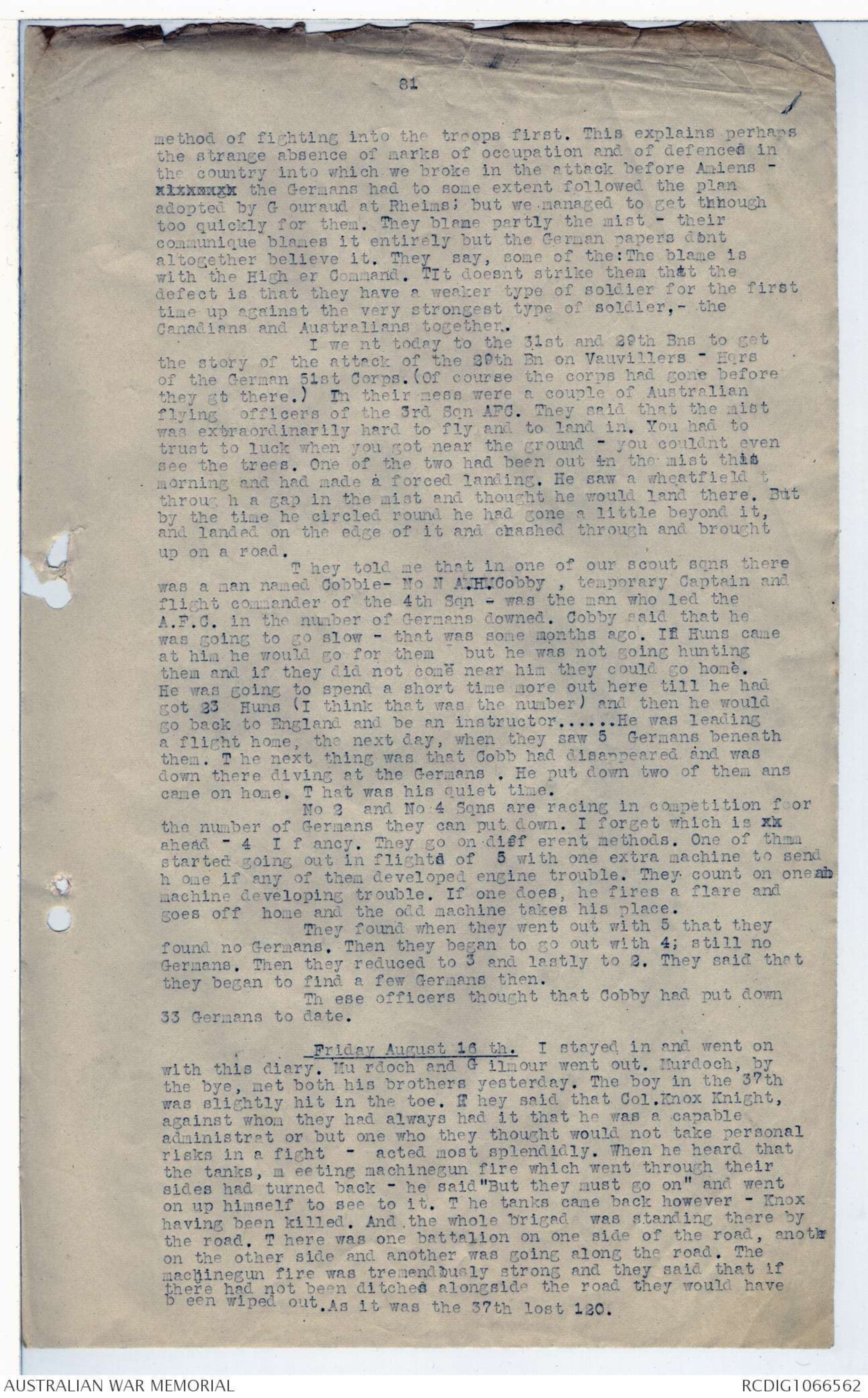
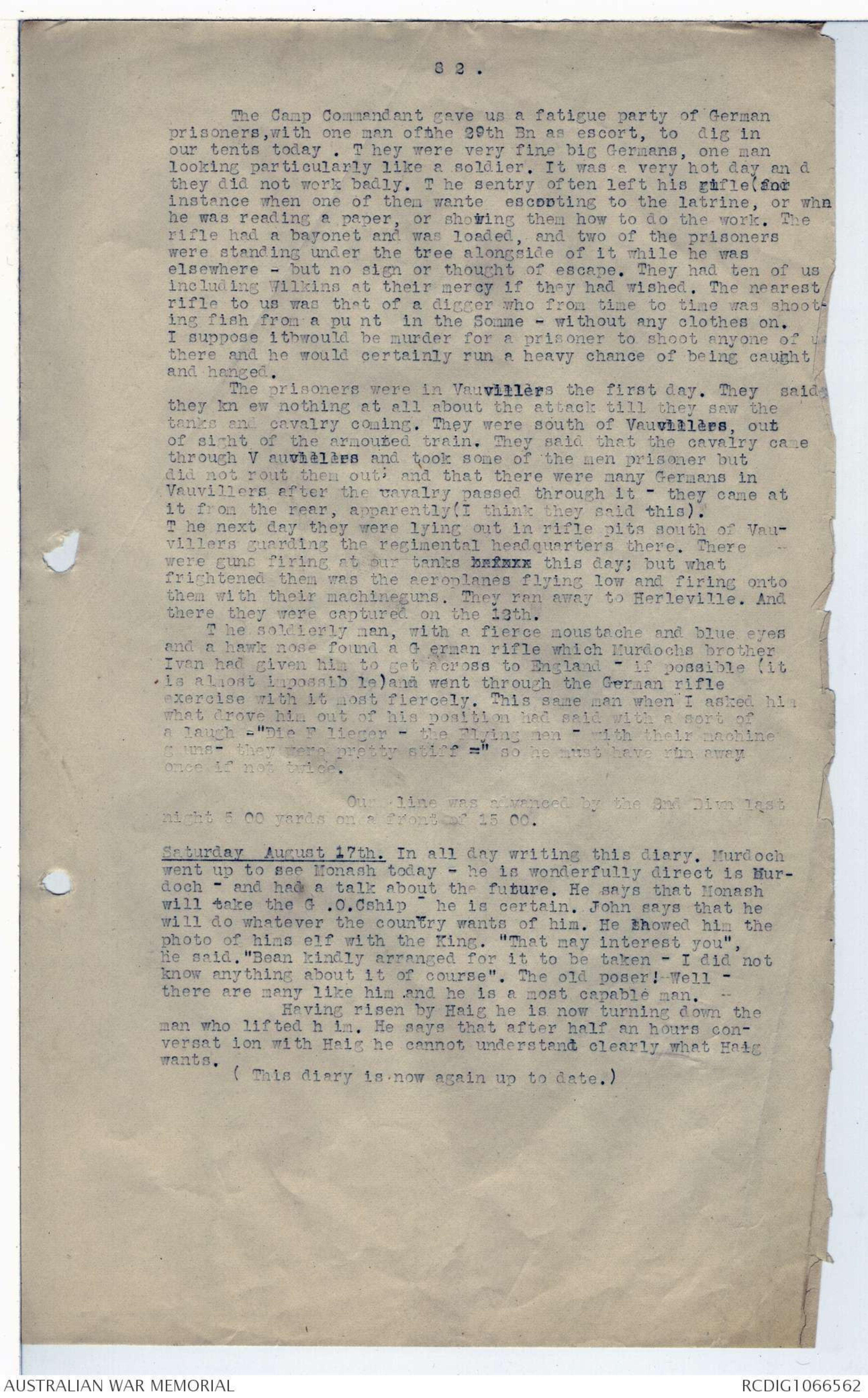
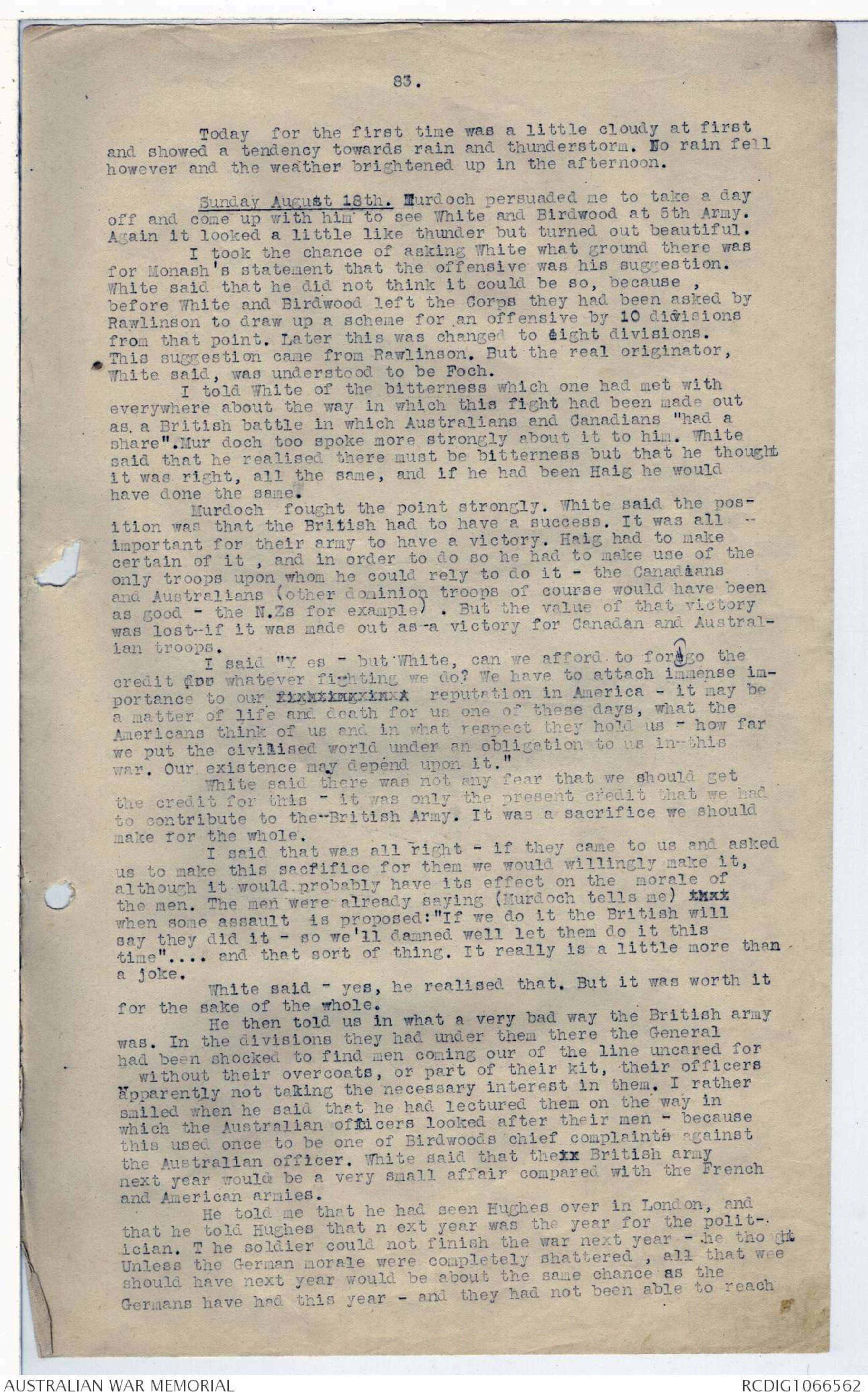
74.
his choice. Whichever he does not choose will go to White. I told
Murdoch that I thought that if the rank of full general went
with the office of G.O.C. there was no question which Monash
would choose. But if there were an alternative - if the holder
of the office would not be J.M's superior as a matter of course -
then John would keep the Corps till the end of the war, and
then go over (as he himself has said) to the other job.
(Murdoch has seen J.M. since and had some very
interesting information from him. In the first place J.M. says
he is responsible for the present battle. After Hamel he had
a talk with the Army commander and told him that he could go
in 5 miles. They said couldnt you go further. John said,
"If you give me a safe support on my right flank I can". They
asked him what Corps he would consider reliable enough. They
suggested first one, then another, and he shook his head at
each. Then they suggested the Canadians. "Yes, the Canadian
Corps will do", said J.M.
It was put up to Foch, and he approved and added the
1st French Army. And someone added the 3rd Corps. John was
away when the approval was given, and Blamey started getting
out the plans. So it was John Monash's battle, and he has certainly
made a great name for himself in it.
Murdoch saw John on the day on which I write this -
August 17th. John said that he would be content to do whatever
the Australian Government thought fit to ask him to do. I think
the old man realises that his battleh onours are won; and would
not be at all sorry now for further promotion and a big administrative
job. He told Murdoch that he realised that it -
was a very big job. Murdoch asked him if he would care to take
the command of a British Army. He said "No - put that out of
your head altogether. "The old man is Australian, and the
biggest thing to him is a great Australian command.
J.M. doesnt worry very much about whether this fighting
by the Australians is winning them credit before the world -
a matter which is exercising the men and officers very much, for
there is certainly a fixed policy on the part of GHQ of not
allowing it to be known what a Dominion-army fight this was.
What J.M. wants to know is -"Is it being fully reported in
Australia?" Murdoch said to him: "Well, the Australians have
the whole credit of having preserved and now freed AMlENS".
John said: "Yes, and do you know they recognise it - they recognise
it fully at GHQ. Do you know - a very unusual thing happened.
There was a conference down there at which Haig was present and
I was there. I had to leave before the end. I said to Haig: 'Field
Marshal, I am afraid I must ask you to excuse me. I have to
meet all my divisional commanders (this must have been at a
conference either at V/Bretonneux or Corps). They are waiting
for me. Haig said - a most unusual thing - that he would
like to come with me and see them to. He came with me and said
to them: 'I have the most complete confidence in your corps
commander - I want you all to know that I trust him absolutely!"
However - that is 5 days ahead)
Gilmour and I took the car through Sailly Sec and along
the road - perfectly quiet now - through Sailly Laurette to
near Chipilly. We were blocked here by our 4th Divl waggon
artillery waggons coming out and a 6in gun being towed up by a
lorry. It was a sweltering hot day and the roads thick with
dust. I got a number of photos of this - dust always makes a
photo interesting.
We left Boddy in a quarry in the steep N. bank of the
Somme which the Germans were using had used to camp in. Every
where one saw their little indug shelters far up the steep grass
slope. Just as we reached the big farm or barn where the
road turns a circle to the right to get into Chipilly we came
on two antiaircraft guns blazing away for all they were worth
at a German aeroplane which was cruising about like a great
hawk about 2000 feet up. He turned his tail straight towards
us, sailed away, and fired a white flare as he did so. I thought
he was giving the position of the guns. But it is much more
75
likely that it was the position of the infantry on the neck
above Bray or behind Etinhem. Possibly the guns in the next
valley.
We were searching for the 13th Inf.Bde. We had heard
at corps that their hqrs were at Sailly Laurette. At Laurette
an Australian traffic control told us he thought they were
on the right hand side of the road before you got to Chipilly.
At the turning into Chipilly someone told us that they were
had a rear headquarters in Chipilly, .but that all the
officers had gone to an advanced hqrs about 2 miles further on.
- up the gully. A very curious gully starts from this point -
rather typical of these gullies in the chalk of the Somme. It
is Y shaped. The left branch - which goes in behind Malard Wood
and Bois des Celestins we did not visit; but the right hand gully
- which runs NE with at least one side branch, is a steep
grassy narrow valley winding back almost through to the
Somme River on the other side of it, and cutting off the
peninsula on which CHIPILLY stands almost in the shape of a pear.
At the head of that gully (where it runs into the Bois de
Gressaire) you have only to climb a steep slope, and there you
are looking straight down into the Somme again, with Etinhem
in the bend just below you,- really Etinhem is on the next
Peninsula which is almost exactly the same as the Chipilly
Peninsula; and beyond that again is the Bray Peninsula.
Chipilly had been badly knocked about - no wonder after
the dusting - it was literally a dusting - which we saw it
get on August 8th. The engineers at the old Bd Hqrs showed
us where the direction of the present Bde Hqrs. One of them
took us up the hill onto the path over the green top: "You
follow this path into that valley (the Gressaire branch) until
you come to a tank. Then you turn half left like towards the
wood and youll see Bde Hqrs on your left".
We did so. Past American infantry, who were resting under
the bank on top of the hill; (their commander complained to
J.M. that he was not giving them sufficiently important work
to do) ; down into the valley past the old tank where one dead
Englishman of the tank Corps was lying. On our left half way
up the slope in a scrubby bank we saw men; and found there
some fine dugouts marked K.T.K. (German Headquarters) and
inside Col.Herring - now Brig Gen Herring, and the 13th
Bde staff at lunch.
Herring was worried - very worried I could see-
by the report that there had, for the last two hours, been
men digging in across the foot of the peninsula on the further
edge of which the 49th and 50th Bns were. The 49th and 50th
which had dug in on the top of the far edge of the peninsula
in the night, had not put posts down the slope on the Somme
flats - the towpath. But they were holding the top of the
hill. And here were men - reported to be Germans - digging in
facing this way (W) on this side of the foot of the peninsula.
For two hours, I believe, Gen. Burgess had been praying to be
allowed to turn his guns onto them, but Bde could not believe
that they were Germans - they must be our own men, Herring
thought. Or at any rate, they might be. And he would not risk
having our guns turned on to our own people - by mistake. The
shock would be too great, of an incident like that.
He gave us lunch - very kindly insisted - and then in
came a report from Col.Christy, that he had had a look at these
men for himself and he was certain that they were Germans. On
the strength of that Herring gave leave for the guns to have
a go at them. As it was a very extraordinary thing, and well
worth watching, Gilmour and I hurried on up to the top of the
valley, and up the steep slope to the narrow fringe of trees,
(not 600 yards from Bde Hqrs) and found ourselves with a few
American infantry, and an Australian artillery officer and a
few of his men, looking straight down on the Etinhem peninsula,
with the little town tucked away in the bend to the left and
the smooth green slope to the right leading up to the razor
76
- like ridge which must have looked down onto the still further
bend of the Somme, by Bray. Indeed we could see the outskirts
of Bray in places just above it. To the left front was the
tableland North of the Somme twoards Carnoy and Fricourt, I
suppose - a bit higher than the top of the peninsula. On the
south side of the river were woods and hills where there must
have been Germans but I could see no movement.
Just S. of Etinhem, across the green smooth slope
ran a road which quickly divided into a Y. The artillery officer
told us that the Germans were digging in across this Y, and also
all around the upper slope of the hill. With the telescopes
-indeed without them - we could pick them up at once. As usually
happens, one expected to see, hundreds of them -from the descriptions
in the form in which Brigade gave them to us; but what
we saw was about a dozen men - in a line of rifle pits which
they had dug obliquely across--the Y a little beyond the fork.
There were 5 or 6 of them standing above their pits digging
for all they were worth. Others I fancy one could just see
the little black pin point heads of, shrunk down like whelks
into their respective holes. Some of those digging were
digging like fury - as far as I could see. They must have
wondered why there was not a shell onto them.
On the top of the lower end of the peninsula there was
another row of pits - rather more of them - perhaps 30 or 40 -
and beyond the edge of the peninsula one could see heads, just
over the top. I thought these must be our men at first, but later
became sure they were Germans. The upper row of pits certainly
belonged to Germans.
We had been watching this for nearly an hour I suppose,
when, about 4 or 4.30pm, there was put down on the northern
end of the peninsula a heavy straf. The German guns shelled
it pretty well as heavily as they shelled Crepy Wood
yesterday. The place reeked with the dust and smoke of the
bursts. I could see no movement on that part although one knew
our men must be there - and it was an obvious place for a c/attack
A single party of four stretcher bearers, the leading man with
his stretcher, the others carrying nothing, wound across the
upper part of the ridge near where the shells were bursting,
-sometimes one saw the smoke this side of them, sometimes the
other - they walked along without apparently paying it any
heed. That was the only movement I saw. Certainly it was a
German c/attack unless he were short of men and were simply
putting down an area straf - but it looked too thick for that.
Afterwards on our return home we heard that the Germans had
attacked the 49th here and been badly beaten off.
On the other hand, at the southern end of the
peninsula, the 50th had the Germans dug in apparently behind
them. We only saw one movement. Behind the village was a
military cemetery. Behind this and a little to the right of
it higher up the hill, was a hollow in the ground. In this I
noticed two men crawling on hands and knees - coming from
nearer to the German end. I was sure they were Australians -
they seemed to have our helmets, and their battle kit, and
their feet, were lighter and more shapely than the German heavy
boot. One of them crept up, with the other after him, to the
edge of the hollow and cautiously looked over. Then they
crept back towards a road which ran up the hill, nearer to
the village. A man was coming out of the village up the road
to meet them. A few minutes later these men seemed to have
foregathered on the road, and one of them walked up the hill
while two stayed in the road which had a bank. The man going up
the hill walked up to the top, and then stood half bending and
looking round him over the edge of it. He took in the situation
there for a while. Then he worked along the top of the hill
Northwards, half bent, walking. He stopped again for a bit
and went over the other side where the shells were bursting. I
lost sight of him for a bit there - I fancied that he must have
placed one of our posts and gone down to visit it. In the mean
time one or two shells began to fall on the reverse slope which
77
he had come from. The second of these fell not far from the
two waiting men and shifted them - they got into a possy near
the bank I fancy. Presently down the hill again came the man
who went up had gone over it. He joined the others: and
together they walked back to a sandpit or gravel pit just at
the back of the village.
I take it this must either have been a patrol, or
an officer visiting his posts. I have since wondered if it
may have been little Salisbury - whom I believe I saw
doing the same sort of work on the second day at Anzac.
The Etinhem peninsula consists of a has a neck
about half way down it' - the hill is lower there and rises
again. It seemed to me that the Germans had managed to
sneak onto most of this lower half - and that we now only
held the northern half. The German seemed to know what he
was doing and where he was, for he never shelled near his
own troops but only the upper half of the peninsula. Etinhem
was getting about one or two heavy shells every minute
and going up in clouds of brickdust.
The shelling for the counterattack seemed to lengthan
and then cease. There came through a message to the artillery
youngster beside us: "Watch square 26 C and 25 D at 5pm."
At 5 pm there came a ranging shot onto the slope 200 yards in
front of those crossroads where the Germans were digging. One
of the Germans was walking down the line at the time - he heard
it coming and dodged as hard as he could southwards across
the road and into the first funkhole where I could see his black
body in the corner of the rifle pit. Then came a few more solitary
shots. Then the artillery of the 4th Divn - fieldguns
and hows (4.5) I should say) descended on that slope and began
to lash it. Most of the shooting seemed to me to be about
100 yards too short. It lasted for 15 minutes - but always
when the smoke cleared away that dark bit of German was in the
corner of the riflepit.
When the other guns had finished shooting one battery,
clearly dissatisfied with the result, kept on. There must have
been an officer registering this battery onto exactly
where our dark friend was. The first H.E. shell fell a little
short. Then it burst not 5 yards away from his pit. Then came
a shrapnel shell burst which whipped up the dust in little
curling columns like a niggers hair from just in front of the
pit. Then he shot in pairs -one H.E.shell bursting on the
ground followed quickly by one shrapnel bursting low in the
air exactly over the place. The H.E was very very close and
the shrap. right on top of the place. I saw the dark spots there
afterwards. But unless the rifle pits were deep they must
have been badly wounded - those Germans - or dead. I saw
none of them move. (I heard next day that they moved out of
those trenches after the shelling - perhaps they did as soon
as they considered it safe to go.)
Gilmour and I walked back to the car. When we arrived
at Corps headquarters the place was front garden was simply
full of guns and howitzers and M.Gs and trench mortars,
facing all ways. And there were two lorries bringing down more
at the end of the drive. Somerville was there cursing that the
lorry drivers of the 2nd Division who had been hard at work
during the previous days had been kept hauling guns to Corps;
and other people were saying that these guns ought really to
be shooting at the Germans till they had fired all their
ammunition. Some few were pleased at the show. Berry, the
Camp Commandant was superintending the getting of them all
arranged. I was told that the Corps Commander considered that
it would be a great thing for the war records to have the King
photographed with all these trophies - a fine record picture
it would make and that the Corps Commander was very keen on it.
As a matter of fact the King is coming here tomorrow, and
is going to knight John with a sword on the steps of his own
chateau, Gen. Currie of the Canadians is coming here too
78
to be knighted. The whole thing seems to me - to some of us -
a damned waste of time and energy at a moment like this. Murdoch
and I have been consoling our incensed selves by picturing
Birdie showing the King round (as he is going to do in the case
of some Australian units) and coming down here and being taken
photographed with the King in the midst of all the trophies
which John had arranged for himself.
Late at night as I was getting the days news, very veyy
tired, I got a note from Berry, to say that the G.O.C. wanted
Wilkins to be at the chateau at 8.45 in order to place the
trophies suitably for a photograph. I made the AM.D.Cs angry
by telling them that I thought the whole thing was a lot of
nonsense - Wilkins was probably very tired after his work up
the front.
The news is that the 3rd Bde got Crepy Wood last night
and the 2nd Bde -to my surprise - went through LIHONS this morning.
(Glasgow told me afterwards that he was determined at an early
stage that he must get the heights by LIHONS in order to let
the Canadian advance get forward. It could not go far if the
Germans had those heights - the map gives them as the highest
land about -109 - higher, I believe than any place in the
Montdidier salient. Glasgow determined to keep on at it with
the 2nd Bde and the 3rd Bde - he was ready to work those brigades
right out in order to preserve one fresh and rested brigade,
the 1st Bde. The 8th Bn is said to have placed posts beyond
Lihons - Mitchell says that he was out beyond it himself. The
10th Bn on the other hand say that they were first into it with
two tanks. Glasgow, who told me this, thinks that perhaps
the 10 th Bn mopped up the place after the 8th had gone thro)
Anyway there seem to have been several c/attacks.
The first was against the Canadians. The Canadians last night
were holding a most ugly salient - they were 2 miles ahead of
us by the map, along the rly line; and they say that there was
no one in between lining the rly - just a gap. They were
through Hallu. The map which came out was certainly one which
hurt the pride of the Australian who looked at it - there were
the Canadians sticking out like a sort of pimple on the flank
of our 2nd Bde. Today the Germans C/attacked. Our people had
advanced this time in the dawn - not in clear daylight - and
got their objectives easily. I dont know what hour the Canadians
were attacked; But they were driven out of Hallu and a long
way back. And tonight their flank is away back behind ours, though
their front protrudes further south.
(By the bye before I forget it - the American Brigade
working with our 13 th is theb131st; the 131st Inf Regt, rather;
and the Wood behind which the R.H.A. drew up their batteries the
first day and in front of which our 38th (?) Bty was so badly
shelled from the Chipilly side, is not Hamilton Wood but I think
Susan Wood (Q 21 Central, any way).
The 3rd Bde was twice c/attacked from the direction
of Auger Wood. The first c / attack penetrated nearly a mile
- it got between our posts and came along the old trenches;
but the Germans who took part in it were I believe all killed
or captured. The second c/attack did not get in.
The two c/ attacks on the 13th Bde were those that we saw-
the one when they shelled the 49 th; and the infiltration of
Germans behind the right of the 50th Bn which was withdrawn.
These last Germans are still there.
News has just come in late that the 3rd Divn have managed
to cut off the neck of the Mericourt Peninsula (enclosing
CATEAUX WOOD).
Monday August 12th. The King came at 3pm today. They
had about 100 men from each division drawn up on either side
of the drive to meet him. He walked up the main walk between two
rows of diggers straight from the battle, apparently taking
not the least interest in the diggers,; stopped to look at
two of John s captured monsters;went on up the Chateau steps
where a carpet and table and sword and a little plush footstool
79.
were waiting - with about five generals and majors and two
very dusty photographers and a cinema man following closely
behind and taking up a position in immediate enfilade like sort
of sacristans. Wilki These were British photographers.
Wilkins phmer as immediately opened their barrage. John was
tapped on the left shoulder and got up before the King had time
to tap him on the right - so I suppose he is only half a knight.
Some other old whitehead - he was not Gen. Currie - I dont know
who he was - got down as far as his old knees would allow him;
each had a ring of ribbon laid round their necks, which John
(immediately he slipped behind the next man) took off. and The
cameras all went snap together - and the great show was over.
John had one other sight for the King - I must say it
was extraordinarily well arranged. He called out to the yard -
and presently there issued from it a string of battered rusty
dusty old transport on aged horses, driven by diggers in their
slouch hats. It was some of the captured German transport with
its own horses. One chap came driving a low waggon with tow skinny
horses of the light German draught type, which gave one an idea
how they were underfed. xThe G Then last of all came a German
ambulance - motor. These interested everyone. The King drove
off. And John and his generals went in to a conference. I
Gelly came down to tea with myself and Murdoch
afterwards. He told me that the idea was probably to have another
push almost at once - further south. Blamey Monash told me of it
immediately afterwards - the 5th division was to take over from
the Canadians south of the rly; and the 4th div from the 1st Northo
of it. And these two were to go forward with a big Canadian
push towards Chaulnes. Chaulnes would be on the left front of
the push - so it would be a most awkward place to take. There
wd be a barrage for a certain way as long as the guns could
follow. After that it would be open warfare and the guns wd
follow as best they could. "There is only one difficulty which
we did not have last time - one main difficulty - John said; and
that is that we do not know where his guns are. We cannot get
our counter battery work going."
Gelly told me that the way in which Maclagan and he
and Hobbs, (and he felt sure Glasgow and Rosenthal as well)
would have liked to fight this battle of last week would have
been on the old principle of giving each division its own
road and letting it go ahead all it could. Gelly said he thought
that Monash was probably a man with sufficiently original ideas
to let them break away from the style of fighting to which they
had grown accustomed - fixed objectives etc. But he was not.
Of course divisional commanders prefer having their
own division on their own road because then they are fighting
their own fight: and the division becomes the unit - notnthe
corps.
Gelly also said that he was not sure what had happened
in the 10th Bdes attack. He thought it was feasible e
enough when it was put before him - It was Monash's idea I
believe. But when the tanks were discovered the infantry
did not do as he would have expected - that is to say - go
straight for the machineguns at once. They waited instead for
the tanks.(Of course Gelly sets a very high standard. He visited
that brigade afterwards and had a talk to the young officers
of the 37 th Bn and told them that of course noone worries
about his life, in an affair like that, but what he worries
about is the right thing to do. The young officers did not
seem to him to have hit on the right way to act - make up their
minds for themselves and go straight at it without reference to
their colonel. . . . . . Murdoch tells me that when he was up there
later they did not understand this yarn - they were wondering
what Gelly meant.)
Murdoch went off to the 20th C.C.S. in an ambulance.
Tuesday August 13th. Corps Headquarters moved today
to Glisy. I went up and saw 1st and 2nd Divisions and chose
80
a site for our camp under the big tree at the end of the grass
by the waterside in the garden of Blangy Chateau.
Gilmour went out to 11th Bde which took the Cateaux and
St German Woods the other night. They had a very heavy fight,
apparently with the Germans in Cateaux wood. They cut them off and
then mopped them up backwards and the Germans fought. 150 Germans
they say were killed - I wont vouch for the number - it may be
exaggerated as usual.
The Germans on the peninsula which they cut off
were all mopped up; and the 13th Bde then (or last night) mopped
up all the Germans on their side of the river in that end of
the Etinhem peninsula. I believe they swept the peninsula and
took about 300 prisoners. The Germans opposite the 11th Bde
in German wood had a barrage laid down on them, and began to
get back - possibly our men were attacking at the same time, I
am not sure. And the Germans put down a barrage upon their own
men there as well as our barrage - by mistake, of course. We
took St German Wood; and further south we managed to get out beyo
beyond Proyart, the attack being made by the men crawling on their
stomachs under hot fire, instead of rushing.
Wednesday August 14th. We shifted camp today. I sent
on Scott with the car; Gilmours car also helped; in three
journeys of each car the whole camp, tents and all was moved.
Bertang les chateau is left to a few officers such as the labour
Commandant and the old Marquis and Men with his long white
beard, who walks round the grounds with Mrs Marquis and grumbles
at our car wheels marking h is huge forest park (the whole of
our occupation will be overgrown before next year) and Mrs Marquis,
who is exactly like a Bulletin picture of a Wowserette -
a dry thin woman in a cramped black hat a short black skirt and
heavy boots - they have their chateau to themselves. They opened
the drawing room for the first time since our occupation when
the King came there - it opens onto the steps of the Chateau
like a throne room, or a back stage in a theatre. The Marquis
is very upset because John never said good bye to him.
Murdoch came out of hospital today. Leg much better,
not broken.He is a very powerful old character. His one idea
is for "the boys". Gilmour is a capable pressman; but, by Jove,
it is an object lesson to see the way Murdoch handles his work -
knows the right hour to go out - the right hour to be back and
get his stuff away - the right people to see and how to get
a story out of them; and has a fine conception of a story too.
Thursday August 1 5th. The second attack was to have
been today. I saw Blamey with Gilmour last night and he told
us that the attack was off. It had been decided to adopt a policy
of conserving men. It was considered that the Australian could
do all that was wanted by cutting out expeditions and patrolling
peaceful penetration as they call it here. If the German became
so stable that he needed a big battle to push him out then
there would be a big set piece. But it had been noticed that he
was firing only with his longer range howitzers - his 5.9s-
as he did before the retreat on the Somme.
Clearly they think that he is going to retire - or are
suspicious of it. That is a very difficult time to attack
without having big losses with comparatively slight advantages.
We captured today or lately- some German orders
issued after the Hamel battle. The first said that Hamel happened
because the forward zone was too strongly held. The divisions
must lighten the garrison in their front zones so as not to lose
a battalion and a half in a single battle as they did there.
Two days later - owing apparently to the lightening, and
our men noticing the extraordinary quietude - they lost a good
part of their front line near V/B. By July 13th the whole front in
line situation of the army (says another order) had been altered
fr the worse. This was through trying to carry out the order
for lightening, without instilling the new principles of this
81
method of fighting into the troops first. This explains perhaps
the strange absence of marks of occupation and of defences in
the country into which we broke in the attack before Amiens -although the Germans had to some extent followed the plan
adopted by Gouraud at Rheims; but we managed to get through
too quickly for them. They blame partly the mist - their
communique blames it entirely but the German papers dont
altogether believe it. They say, some of the:The blame is
with the Higher Command. TIt doesnt strike them that the
defect is that they have a weaker type of soldier for the first
time up against the very strongest type of soldier, - the
Canadians and Australians together.
I went today to the 31st and 29th Bns to get
the story of the attack of the 29th Bn on Vauvillers - Hqrs
of the German 51st Corps. (Of course the corps had gone before
they gt there.) In their mess were a couple of Australian
flying officers of the 3rd Sqn AFC. They said that the mist
was extraordinarily hard to fly and to land in. You had to
trust to luck when you got near the ground - you couldnt even
see the trees. One of the two had been out in the mist this
morning and had made a forced landing. He saw a wheatfield
through a gap in the mist and thought he would land there. But
by the time he circled round he had gone a little beyond it,
and landed on the edge of it and crashed through and brought
up on a road.
They told me that in one of our scout qns there
was a man named Cobbie- No N A.H. Cobby, temporary Captain and
flight commander of the 4th Sqn - was the man who led the
A.F.C. in the number of Germans downed. Cobby said that he
was going to go slow - that was some months ago. If Huns came
at him he would go for them but he was not going hunting
them and if they did not come near him they could go home.
He was going to spend a short time more out here till he had
got 23 Huns (I think that was the number) and then he would
go back to England and be an instructor. . . . . . He was leading
a flight home, the next day, when they saw 5 Germans beneath
them. The next thing was that Cobb had disappeared and was
down there diving at the Germans. He put down two of them ans
came on home. That was his quiet time.
No 2 and No 4 Sqns are racing in competition for
the number of Germans they can put down. I forget which is ah
ahead - 4 I fancy. They go on different methods. One of them
started going out in flights of 5 with one extra machine to send
home if any of them developed engine trouble. They count on one ab
machine developing trouble. If one does, he fires a flare and
goes off home and the odd machine takes his place.
They found when they went out with 5 that they
found no Germans. Then they began to go out with 4; still no
Germans. Then they reduced to 3 and lastly to 2. They said that
they began to find a few Germans then.
These officers thought that Cobby had put down
33 Germans to date.
Friday August 16 th. I stayed in and went on
with this diary. Murdoch and Gilmour went out. Murdoch, by
the bye, met both his brothers yesterday. The boy in the 37th
was slightly hit in the toe. They said that Col.Knox Knight,
against whom they had always had it that he was a capable
administrator but one who they thought would not take personal
risks in a fight - acted most splendidly. When he heard that
the tanks, meeting machinegun fire which went through their
sides and turned back - he said "But they must go on" and went
on up himself to see to it. The tanks came back however - Knox
having been killed. And the whole brigade was standing there by
the road. There was one battalion on one side of the road, another
on the other side and another was going along the road. The
machinegun fire was tremendously strong and they said that if
there had not been ditches alongside the road they would have
been wiped out. As it was the 37th lost 120.
82.
The Camp Commandant gave us a fatigue party of German
prisoners, with one man of the 29th Bn as escort, to dig in
our tents today. They were very fine big Germans, one man
looking particularly like a soldier. It was a very hot day and
they did not work badly. The sentry often left his rifle (for
instance when one of them wante , escorting to the latrine, or when
he was reading a paper, or showing them how to do the work. The
rifle had a bayonet and was loaded, and two of the prisoners
were standing under the tree alongside of it while he was
elsewhere - but no sign or thought of escape. They had ten of us
including Wilkins at their mercy if they had wished. The nearest
rifle to us was that of a digger who from time to time was shooting
fish from a punt in the Somme - without any clothes on.
I suppose itbwould be murder for a prisoner to shoot anyone of us
there and he would certainly run a heavy chance of being caught
and hanged.
The prisoners were in Vauvillers the first day. They said
they knew nothing at all about the attack till they saw the
tanks and cavalry coming. They were south of Vauvillers, out
of sight of the armoured train. They said that the cavalry came
through Vauvillers and took some of the men prisoner but
did not rout them out; and that there were many Germans in
Vauvillers after the cavalry passed through it - they came at
it from the rear, apparently(I think they said this).
The next day they were lying out in rifle pits south of Vauvillers
guarding the regimental headquarters there. There
were guns firing at our tanks before this day; but what
frightened them was the aeroplanes flying low and firing onto
them with their machineguns. They ran away to Herleville. And
there they were captured on the 12th.
The soldierly man, with a fierce moustache and blue eyes
and a hawk nose found a German rifle which Murdochs brother
Ivan had given him to get across to England - if possible (it
is almost impossible) and went through the German rifle
exercise with it most fiercely. This same man when I asked him
what drove him out of his position had said with a sort of
a laugh -"Die Flieger - the Flying men - with their machine
guns- they were pretty stiff -" so he must have run away
once if not twice.
Our line was advanced by the 2nd Divn last
night 5 00 yards on a front of 15 00.
Saturday August 17th. In all day writing this diary. Murdoch
went up to see Monash today - he is wonderfully direct is Murdoch
- and had a talk about the future. He says that Monash
will take the G .O.Cship - he is certain. John says that he
will do whatever the country wants of him. He showed him the
photo of himself with the King. "That may interest you"
he said. "Bean kindly arranged for it to be taken - I did not
know anything about it of course". The old poser! Well -
there are many like him and he is a most capable man.
Having risen by Haig he is now turning down the
man who lifted him. He says that after half an hours conversation
with Haig he cannot understand clearly what Haig
wants.
(This diary is now again up to date.)
83.
Today for the first time was a little cloudy at first
and showed a tendency towards rain and thunderstorm. No rain fell
however and the weather brightened up in the afternoon.
Sunday August 18th. Murdoch persuaded me to take a day
off and come up with him to see White and Birdwood at 5th Army.
Again it looked a little like thunder but turned out beautiful.
I took the chance of asking White what ground there was
for Monash's statement that the offensive was his suggestion.
White said that he did not think it could be so, because,
before White and Birdwood left the Corps they had been asked by
Rawlinson to draw up a scheme for an offensive by 10 divisions
from that point. Later this was changed to eight divisions.
This suggestion came from Rawlinson. But the real originator,
White said, was understood to be Foch.
I told White of the bitterness which one had met with
everywhere about the way in which this fight had been made out
as a British battle in which Australians and Canadians "had a
share".Murdoch too spoke more strongly about it to him. White
said that he realised there must be bitterness but that he thought
it was right, all the same, and if he had been Haig he would
have done the same.
Murdoch fought the point strongly. White said the position
was that the British had to have a success. It was all
important for their army to have a victory. Haig had to make
certain of it, and in order to do so he had to make use of the
only troops upon whom he could rely to do it - the Canadians
and Australians (other dominion troops of course would have been
as good - the N.Zs for example). But the value of that victory
was lost-if it was made out as a victory for Canadan and Australian
troops.
I said "Yes - but White, can we afford to forego the
credit for whatever fighting we do? We have to attach immense importance
to our fighting in a reputation in America - it may be
a matter of life and death for us one of these days, what the
Americans think of us and in what respect they hold us - how far
we put the civilised world under an obligation to us in--this
war. Our existence may depend upon it."
White said there was not any fear that we should get
the credit for this - it was only the present credit that we had
to contribute to the--British Army. It was a sacrifice we should
make for the whole.
I said that was all right - if they came to us and asked
us to make this sacrifice for them we would willingly make it,
although it would probably have its effect on the morale of
the men. The men were already saying (Murdoch tells me) that
when some assault is proposed: "If we do it the British will
say they did it - so we'll damned well let them do it this
time". . . . and that sort of thing. It really is a little more than
a joke.
White said - yes, he realised that. But it was worth it
for the sake of the whole.
He then told us in what a very bad way the British army
was. In the divisions they had under them there the General
had been shocked to find men coming our of the line uncared for
without their overcoats, or part of their kit, their officers
apparently not taking the necessary interest in them. I rather
smiled when he said that he had lectured them on the way in
which the Australian officers looked after their men - because
this used once to be one of Birdwoods chief complaints against
the Australian officer. White said that the British army
next year would be a very small affair compared with the French
and American armies.
He told me that he had seen Hughes over in London, and
that he told Hughes that next year was the year for the politician.
The soldier could not finish the war next year - he thought.
Unless the German morale were completely shattered, all that we
should have next year would be about the same chance as the
Germans have had this year - and they had not been able to reach
 Diane Ware
Diane WareThis transcription item is now locked to you for editing. To release the lock either Save your changes or Cancel.
This lock will be automatically released after 60 minutes of inactivity.